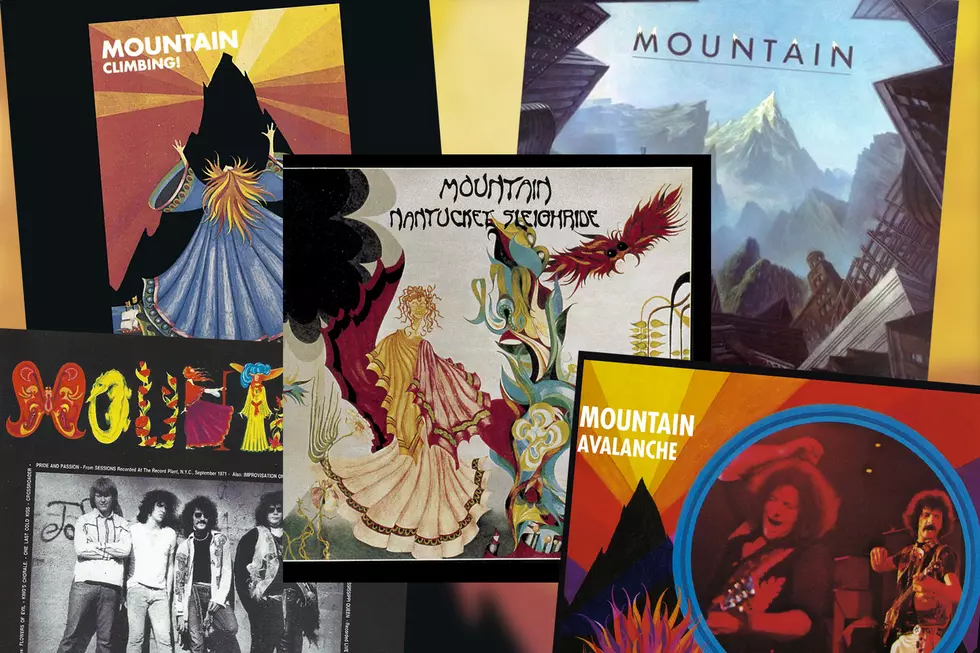
Top 10 Mountain Songs
In some ways, Mountain were in the wrong place at the wrong time. Their influence turned out to be as heavy as their musical output – but they somehow missed out on the appreciation they deserve in rock history.

The band, in principal, was a balancing act between the forces of guitarist and singer Leslie West and bassist, singer and producer Felix Pappalardi, with drummer Corky Laing a strong middle-grounder. The ease with which they offset their skills hid the personality challenges they endured, and the result was a criminally short stay on the big stage.
The majority of their best work was done in the beginning, before the trappings of success got in the way. If fate didn't take a different turn, their early material was strong enough to carry them through to the biggest festivals of the modern era. As it stands, Mountain remain partly obscured by the success of bands they influenced over the years. West alone is cited as a key inspiration by guitarists as different as Red Hot Chili Peppers' John Frusciante and Jethro Tull's Martin Barre.
A trip through the Mountain catalog is a discovery of balance and contrast, from Southern rock to proto heavy metal and all stops in between. The below list of the Top 10 Mountain Songs is a good place to start.
10. “Sister Justice”
From: Avalanche (1974)
A fitting end to the key trio of West, Pappalardi and Laing (Laing just returned to the band, Pappalardi was about to leave), “Sister Justice” was created when Pappalardi was apparently assuming control. Even so, the communication among the musicians is still present, with elegance and understatement working their magic. The song opens with a definitive West riff, supported by Laing’s authoritative rhythm statements; then Pappalardi’s lead vocal offers a soft topping. But the lyrics are much darker than the cross-city travel suggested by the music: Dusty, who seeks “powdered glory,” is not a happy man – and neither were the members of Mountain. At least they were able to express it in such a memorable way.
9. "To My Friend"
From: Climbing! (1970)
While West is best known for his geologically giant riffs, he takes time out on this delicate instrumental piece. The friend in question was Pappalardi, who promised to give West a $7,000 guitar once played by Eric Clapton if he wrote a song. This is the result. "To My Friend" still features some of those left-field chord changes, but here they seem more playful than plate-quaking. There are strong elements of folk revival, notably in the vein of Led Zeppelin – perhaps, partly, the intention was to show West’s Jimmy Page-level mastery of heavy and light.
8. "Hard Times"
From: Go for Your Life (1985)
Mountains don’t often collapse, but they always erode, and while the band clearly did their best songwriting work in their earlier days, “Hard Times” proves the attitude and character were still there in the ‘80s, even after Pappalardi’s death. The original message is present, secured by West’s prominence in the song. But in a musical world that’s changed so much, you can hear touches of Eddie Van Halen-style lead and ZZ Top-influenced production. And although the drum track in particular dates the piece to that confused stadium-chasing big-hair era, "Hard Times" is a strong song. It would take only an hour or two at the mixing desk to make it ageless.
7. "Crossroader"
From: Flowers of Evil (1971)
By the time Mountain assembled their half-studio, half-live third album, all was not well. Critics point to the fact that Pappalardi had become chief songwriter and singer, with West’s guitar demoted to a supporting role, as a key signal of misbalance. But they could still get it right, as evidenced on “Crossroader.” You know what it’s about (even without knowing the vague concept behind the LP) – he’s a crossroader (baby) and it’s an old story. But how it’s told is still the most important thing, and this drifty blues piece has all the taste and style it needs.
6. "Silver Paper"
From: Climbing! (1970)
A classic slice of Southern rock with almost prayer-meeting vocals at points. The move from the quiet valleys to the thundering peaks is smooth and effortless – not as easy to achieve as Mountain make it seem – and the upbeat message is infectious. At a little more than three minutes, Pappalardi makes the smart decision to fade it out. The result? Leaving us wanting more. That’s a clever trick to pull on a strictly structured song that doesn’t do as much structurally as most of the band’s work. Which is not to say it’s just a palate cleanser between monster tracks, because it isn’t; it’s another exercise in emotive energy.
5. "Theme for an Imaginary Western"
From: Climbing! (1970)
Pappalardi produced Jack Bruce’s 1969 solo album Songs for a Tailor and was so impressed with "Theme for an Imaginary Western" that he suggested a cover version to West. It was a great choice: The writing style fits with Mountain’s musical outlook. With Pappalardi’s soft, almost easy-listening vocal delivery, it highlights just how musically subtle the band could be - something that could sometimes be overshadowed by their musical weight. It’s arguably better than Bruce’s original in many ways, but the fact that their energies merged so well means it’s no surprise the Cream legend later collaborated with West on a number of projects.
4."For Yasgur’s Farm"
From: Climbing! (1970)
“A simple story of a younger life” becomes a deeply sensitive exploration of “better to have loved and lost.” The title refers to Max Yasgur, whose farmlands served as the site of the historic Woodstock festival; this song was written in the months after Mountain’s appearance there. So it’s easy to discern at least two stories in the lyrics, as West and Pappalardi share vocals to maximize the contrast. Bittersweet and reflective, but still defiant and heavy, "For Yasgur's Farm"'s most notable feature is West’s solo, which reinforces the story to an almost supernatural level. Anyone who’s ever taken a risk in life will understand.
3. "Never in My Life"
From: Climbing! (1970)
With Guns N’ Roses-style abandon, the question-answer bounce between lead vocal and lead guitar add much sleaze to a song that didn’t really need more. "Never in My Life" falls somewhere between a groove and a stomp, and the fact that the band keeps it moving is what makes it so powerful. It’s interesting to consider what might have happened if they’d played in the double-speed time suggested in the intro. See the second half of “Paradise City” for a possible answer.
2. "Nantucket Sleighride"
From: Climbing! (1970)
An epic song for an epic story. The phrase “Nantucket sleighride” was invented by whalers to describe what happens after harpooning a whale, when the mammal could drag a boat at up to 20 mph until it ran out of energy. The song is dedicated to Owen Coffin, a crewman who volunteered to be killed and cannibalized by his friends after a whale had sunk their vessel (the story also partly influenced Moby-Dick). Back in the studio, Mountain emulate the ebbs and flows of the tide and the whalers’ fortunes, culminating in a crushing coda that’s best known in the U.K. as the theme music for the current-affairs show Weekend World.
1. "Mississippi Queen"
From: Climbing! (1970)
What a way to open a catalog – the first track on Mountain’s first album will always be known as their signature song. All the heavy rock and deep blues are here, along with a glam edge that suggests Kiss were listening (and could do a better cover than Ozzy Osbourne did). With a glimmer in his eye, West tells one of those old blues stories about how a woman turned him into a man. The lead riff – a genuine rock classic – is given plenty of space to breathe and express its raw power. And the simple cowbell intro (an accident of recording) sets the scene so perfectly, it’s one of the best examples of “less is more” in rock history.
Top 100 Albums of the '70s
More From US 103.1 FM









